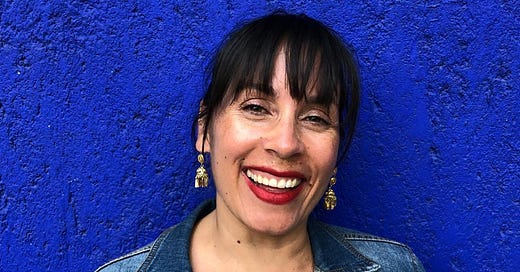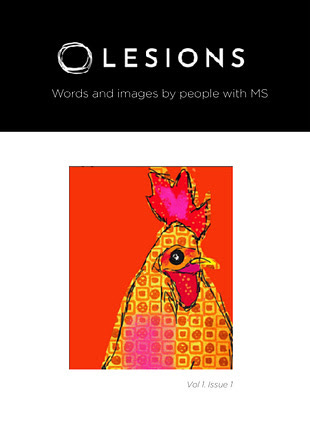Michelle Marie Robles Wallace has an MFA, was a recipient of a Janavi Held Artist Grant, two San Francisco Artist grants, a SF Writers' Grotto Fellowship and finalist in Somos en escrito's Extra-Fiction contest. She is in Parakeet and is a member of the San Francisco Writers’ Grotto. She's published short memoir, fiction and journalism, reported from Mexico and Central America and writes along themes of healing and borders. She is working on a collection of short fiction, a memoir about healing from Lyme disease, and recently started a multidisciplinary art project about reclaiming power for the feminine divine. Motherhood has been a crucible for Michelle's art practice, expanding it in wildly unexpected ways. Follow her on Instagram @michellewallacepaints.
This is How You Make Like Everything is Fine
Creative Nonfiction inspired by Jamaica Kincaid’s “Girl”
When the doctors tell you that nothing is wrong with your body, believe them.
Roll up your symptoms as if they were pieces of paper, crumple them into little balls and eat them. Close your lips over them and swallow them down. When your throat seizes or your stomach revolts, remember what the doctors said. Force them down and lock your jaws against any upward movement.
Keep one eye turned inward, keep watch of what is happening inside your body, although you have no name for it, no precedent. Note the cycling fevers and chills, the sharp, lingering muscular pain, the fire in your joints, the gathering fatigue. Shower often, to wash away the congealed sweat that follows the fevers, explain away the pain with sports injuries, the fatigue with mom’s continual refrain: you are doing too much. Cock your head to one side, listen to what your body tells you, even if you have no way to interpret it. The burning within your neck, the insatiable, desperate thirst, the eyes that have forgotten they have a partner, the way you begin to read, reach the end of the page only to realize that you have forgotten to pay attention. Start again. And again. Close your book, move on to some other assignment, fight against the rising fatigue, the words that have suddenly ceased to exist, find that you can’t remember what you are doing or how you even got here. Be still. Stand vigil as migraines roll in, as your mind turns to thick, sticky cotton, as your body dries up and accepts no water, as the fatigue turns heavy and weighs on you like a shroud. Know that something is badly wrong but without words for it, you must wait.
Silence your knowing, swallow it down, focus on your outward appearance. Part your hair on the side, pull it back into a low ponytail to cover the bald patches. Let the sun brown your skin to disguise the greyish-green hue you turn when you are tired. You are always tired. Grit your teeth to stop fatigue from turning into a yawn, occupy yourself with fixing your scarf, your coat, your hair, your purse, anything, when you find yourself lost again. Take a moment to recover. You may not know where you are, but you’ll know where you are not. Believe that nothing is wrong with you physically, only that you are failing yourself. Latch on to the word, psychosomatic, and believe that you caused all of this. Stop drinking coffee, alcohol, cut out sugar and dairy and anything you don’t prepare yourself. Go to bed early and lie infuriatingly wide awake until morning. When the words fail, and memory dissipates, smile. Smile bigger. Smile when you run into people you don’t remember knowing, even when they tell you to say hello to your folks. Don’t speak of what isn’t happening in your body, smile wider, force some warmth into your eyes, agree that you should get together sometime, listen carefully, surely they will say something that will trigger a memory and if not, keep smiling.
Feel as if you are not properly tethered to your body. Experience your body as a dry, barren husk and when you think of yourself, recognize that by only being able to conjure up an image of an ancient clay bowl, shattered and badly put back together again means that something is critically wrong.
Hold this image of yourself close to you. It confirms what you already know: that what is wrong is nothing more than your own failing.
Feel as if you are slipping out of contact with life.
Work, because what other choice do you have? Force yourself to act through the fatigue and although your body begs you to rest, reprimand it for its reckless endangerment: to rest would require hushing that fiercest part of yourself that can override the demands of your body; if you give yourself respite, there is a chance that you may never get up again. Do not, under any circumstance, let yourself relax.
Cobble together an income from a series of part-time jobs. Prefer these, although you work seven days a week, to a full-time job, because this way, you can disappear more easily, can longer keep the odd things happening to your body unquestioned. Realize that too much time has gone by to still not know your coworkers’ names, to still not remember their stories. Understand that they see this too: notice how they all drift away from you at work, go to other workers’ wait stations or desks to joke and laugh. Know that it is time to move on. Find another job, jobs, always a step down. Laugh bitterly at your downward mobility. You had once had so much promise. Lose your apartment, pack up your things to move in with your ex, find that you don’t have the energy to own anything more than what is necessary. Set whatever doesn’t fit into a single suitcase out on the street for others to take. Forget whatever you used to own.
Feel like you are underwater and the rest of the world lives above the surface. You can’t understand them and when you call out, your mouth fills with water. Choke on your words. They hear you coughing.
Walk to escape the isolation. Walk the length of the island in a day, walk home from work even though you are exhausted and your body screams for you to take a cab. Walk to find communion with yourself, to feel your body in motion, fluid, beautiful. Walk to believe yourself a part of the city you love, to be surrounded by people also moving through it. Pause whenever some small beauty catches your eye. Stare up at it and let it soothe you: streetlight glinting through raindrops; the sun shafting through a canopy of spring leaves; a dining room filled with people laughing, eating, talking, the light glowing orange and warm in the early winter evening. Walk, to forget that you are outside and they are inside. Walk, because the wanting threatens to break you.
When the fire flares in joints you have never injured, let the alarm sound. Ask a friend: Are you always in pain? Follow her direction, see a doctor, one who demonstrates his care for you by how intently he listens, and then in the series of illnesses he lists that he wants to test you for. Give blood. Watch worry tighten the face of the nurse when the blood comes out slowly, thickly, closer to solid than liquid. Assent when he asks if you have had any water, anything at all, to drink that day. Nod, and show him your empty water bottle. Pick up when the doctor’s office calls you. Insist that the receptionist tell you why they need to see you again before making an appointment. Have something to lean on when she says, Lyme Disease. Understand, in the moment that she speaks, that the way out will be more harrowing, longer, and bleaker than the way in. And yet, give thanks that you have a name, a starting point.
Print and ebook Lesions Vol. 1 is out now.
Are you a writer, musician, artist, or filmmaker living with a chronic condition? Submit to Lesions by emailing editor.lesions@gmail.com. See the full submission guidelines here.







Powerful piece!